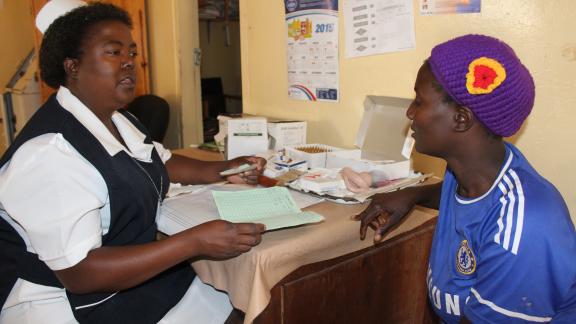Before Agnes Nkandu found out about contraception the 24-year-old was constantly worried about getting pregnant. As a result she found it difficult to enjoy married life.
It was while she was pregnant with her first child that she found out about family planning and about spacing children from her local clinic in the Chongwe District of Zambia.
Agnes made the decision to use the family planning services because she wanted to ensure that her births were spaced. She now has three children and believes spacing them has meant that they have all received quality care and the chance to lead a dignified life.
“I have observed that couples that do not space their children have difficulties taking care of them,” she said. “I do not want my children to be a bother to anyone and that is why I sought family planning services to enable us to have control over the number of children we have.”
Agnes is now supporting other women so they have the same choices.
She said: “Those that I interact with attest to the fact their lives have improved as a result of them using family planning services. Most women are able to invest in initiatives that advance their personal development such as going back to school or starting a business. They have realised that there is more to life than just bearing children.”
Agnes said that men were also becoming supportive of their partners’ need to access the services.
“More women from my community have continued to benefit from these services as evidenced by the reduction in the number of children they have. Married people are now only having the number of children they can afford to provide for,” she added.
Agnes told us that it had helped to reduce the number of unsafe abortions which often resulted from unplanned pregnancies. She said people were now making informed decisions concerning their reproductive health issues because the information and services were available.
George Phiri, Agnes’s husband, a 38-year-old bricklayer, said he thought that family planning was the key to easing the income and financial burdens on a household.
He said: “Even men have come to appreciate the benefits of family planning services. Some have even started escorting their wives to health facilities to seek these services.”
“My wife and I used this service to help us not have any unplanned children and to give space to the ones we have already to develop well. I felt happy because I knew that I had made the right decision to learn about family planning methods. We are able to concentrate on our work without worrying about having an unplanned pregnancy,” he added.
More people, and an increasing number of men, are becoming involved in supporting their partners in accessing family planning services. Because couples are having only the number of children they are able to support and nurture, cases of child neglect are rare.
“A healthy woman is productive and efficient. Therefore, we need to ensure that more women have access to family planning information and services because that is a sure way of promoting healthy and productive families and communities”, asserts Agnes.
Agnes was, however, quick to point out that myths and misconceptions about conventional family planning methods still exist. She stressed the need for an increase in awareness raising initiatives aimed at dispelling such suspicions:
“Some people still think that it becomes difficult to conceive after taking contraceptives over a period of time. But that is not true. I know that you can still conceive when you choose to even after taking family planning commodities for years because I conceived my second child after taking family planning pills for four years. And I am aware of many women in my community that can attest to the fact that contraceptives do not affect one’s fertility,” said Agnes.
At the London Family Planning Summit in 2012, the Government of Zambia made a number of pledges and commitments towards budgets, programmes and policies for family planning.
The Zambian Government promised to increase access to a range of contraceptives, particularly for the underserved or disadvantaged populations. It also pledged to permit an increase in task shifting to community health assistants, which will make more efficient use of human resources and tackle staff shortages.
There are many women and adolescents in Zambia who are not as lucky as Agnes in accessing rights based family planning services. The Government of Zambia still needs to do more to expand access to sub-district structures and empower girls with the right information and services around family planning.
when
Blog Series
Expanding access
Subject
Contraception








